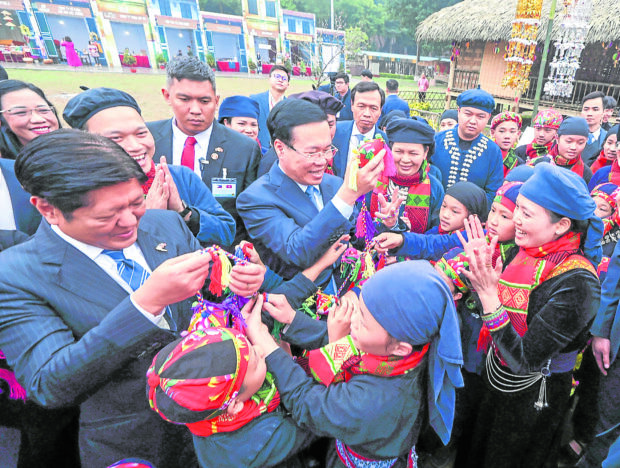
STRATEGIC PARTNER | President Ferdinand Marcos Jr., with Vietnamese President Vo Van Thuong, is welcomed by children who form part of the welcoming party at the Imperial Citadel of Thang Long in Hanoi on Tuesday, the second day of his state visit which saw the signing of major agreements mainly in agriculture and security. (PPA POOL)
HANOI, Vietnam — The Philippines and Vietnam on Tuesday signed an agreement that would allow private Vietnamese traders to supply Filipino counterparts with up to 2 million metric tons (MT) of rice annually for five years at fair prices, and another deal on increased cooperation between their coast guards and the prevention of untoward incidents in the South China Sea.
Both agreements were signed during President Ferdinand Marcos Jr.’s two-day visit, where he met with Vietnamese President Vo Van Thuong, Prime Minister Pham Minh Chinh, and Chair Vuong Dinh Hue of the National Assembly of the Socialist Republic of Vietnam, which is the country’s parliament.
Also signed was a memorandum of understanding (MOU) on a five-year cultural cooperation program between the Philippines’ National Commission for Culture and the Arts of the Republic and Vietnam’s Ministry of Culture, Sports and Tourism. The program expands the exchanges established under a similar accord signed in 1998.
Major exporter
The MOU on rice creates a framework for cooperation between the Philippines and Vietnam, one of the world’s biggest rice exporters, to ensure a sustainable food supply amid the impact of climate change, pandemics, and other events external to both countries.
Vietnam, through its private sector, commits to supply 1.5 million to 2 million MT of white rice to the Philippines’ private sector a year at a competitive and affordable price for a period of five years.
The Philippines and Vietnam are also expected to exchange information on policies, plans and regulations, and other rice-trade-related activities through the MOU.
It seeks to intensify bilateral linkages in agriculture, rural development and other related fields, as well as establish 19 areas of cooperation in high-value crops, livestock and aquaculture, farm management and sustainability, smart agriculture and aquaculture technology, research training, and exchanges of experts.
The maritime deal aims to establish a comprehensive partnership between the two nations’ coast guards on capacity building, training, and personnel and ship exchanges, all to improve their ability to operate together, Marcos said in remarks made in a meeting with Chinh.
“The South China Sea remains to be a point of contention,” Marcos said at the meeting. “We are firm in defending our sovereignty, sovereign rights, and jurisdiction against any provocations. But at the same time, we are also seeking to address these issues with China through peaceful dialogue and consultations as two equal sovereign states.”
Before meeting President Thuong, Marcos said Vietnam was “the sole strategic partner of the Philippines” in Southeast Asia and stressed that maritime cooperation was the foundation of that relationship.
“The world and regional situation is evolving in a rapid and complicated manner and therefore we need to unite and cooperate more closely,” Chinh said, noting Marcos’ visit helped boost bilateral relations.
Competing claims
It aims to strengthen the understanding, mutual trust and confidence between the two countries through the development of a Joint Coast Guard Committee to discuss common issues and interests between the Philippine and Vietnamese coast guards that will also entail the establishment of a hotline mechanism.
The two countries have competing claims over some parts of the South China Sea, a conduit for $3 trillion of annual ship-borne trade that China claims almost in its entirety.
The agreement could risk angering Beijing, especially if they paved the way for future compromises on disputed claims. China tends to view progress in the resolution of border disputes among other claimants with skepticism.
Both Hanoi and Manila have had run-ins with China’s coastguard in the past, but altercations have been frequent in the last year between vessels of China and the Philippines, adding strain to deteriorating relations.

